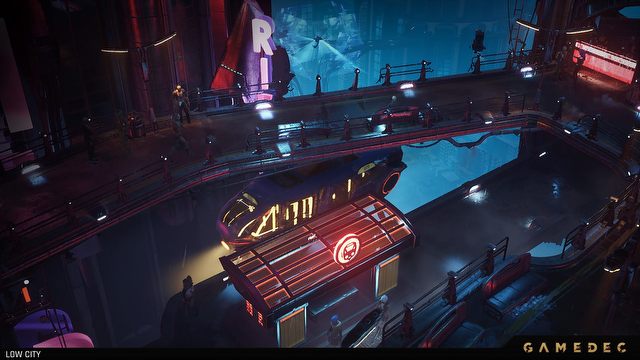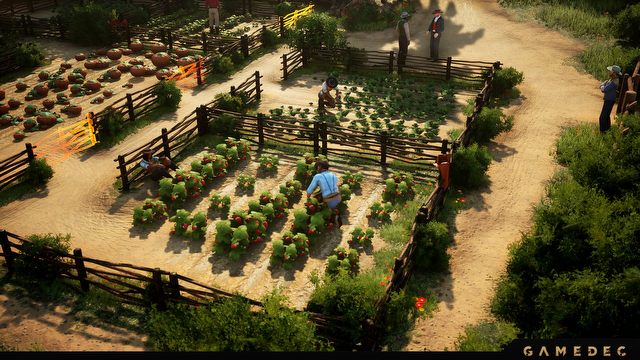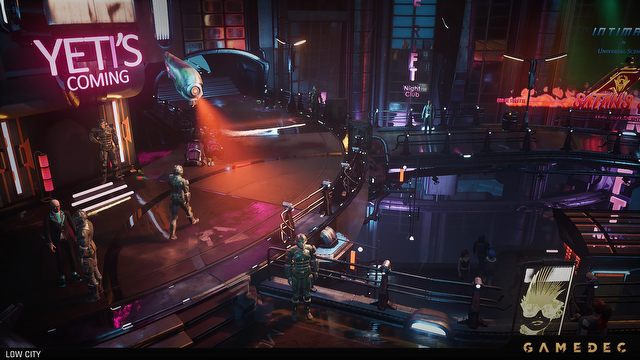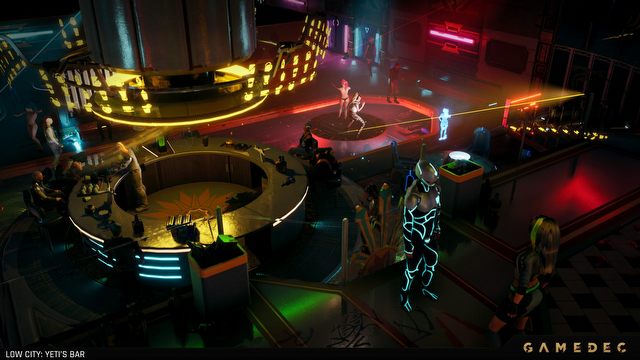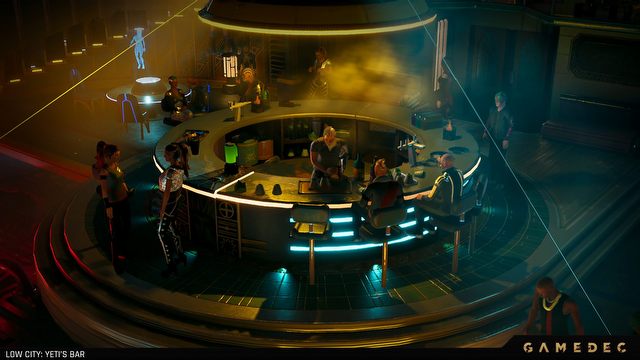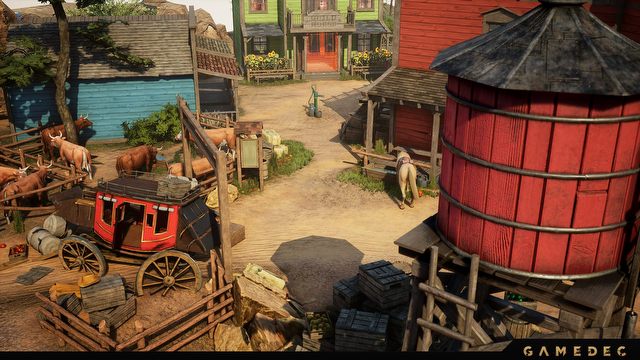Gamedec Preview – Disco Elysium Meets Cyberpunk
As one of the first journalists in the world, I had a chance to try Gamedec, the new RPG from Anshar Studios. And I have good news! If all goes well, this game can make some noise.
RPGs change. Even the isometric role-plays harking back to the classics had to move forward to survive. However, "move forward" isn't tantamount to "compromise." Disco Elysium has knocked the doors down for the players who want to immerse in the story, play a character, and completely forget combat. The title provided an experience as close as possible to traditional RPG sessions. Cyberpunk Gamedec jumps and rides on the same wagon. I talked to the developers, played the pre-alpha version, and decided it would be a strong title. The next (small) big thing. The indie that roared.
HELLO, DETECTIVE! AFTER HEARING THE TESTIMONY AND OUR CONCLUSIONS, YOU WILL LEARN:
- What is Gamedec and how does it differ from most RPGs?
- How does the universe work?
- Who is Gamedec?
- How is this project created?
- What will the players say over a beer when they finish playing?
Each game has a story behind it
Going to the show, I didn't really know what to expect. The first trailer and screenshots foreshadowed a moody RPG with a strong focus on storytelling, and an unusual world. And at the same time, the materials did not really say anything specific. As a result of an amusing incident (which I'll write about later), I received an invitation to the studio to see for myself what's what. It was a cold and bleak day, seemingly the default setting of the blocks of flats of Katowice, the Polish city where Anshar Studios dwell, and where I met Marcin Przybylek, author of stories about Gamedec, and Marcin Rybinski, the lead designer of adaptation.
WHO IS MARCIN PRZYBYLEK?
The man who cried after finishing Planescape: Torment. Actually, I can understand him. Author of, among others, Gamedec, White Eagle and CEO Slayer. Together with Anshar Studios, he's creating an adaptation of his book series. As a full-time employee, he acts as a consultant on the story, world, characters, and aesthetics, and also writes some of the texts and dialogs.
After seeing the presentation, playing the game, and talking to my hosts, I can safely assume that Disco Elysium has got a worthy rival. Or at least a partner in a crime, depends how you look at it. After all, this territory has not yet been conquered by either Baldur's Gate or Divinity. This was once the reign of the Lady of Pain, Planescape: Torment. But that was a long time ago. And although it's fun to return to the first Torment, you need to keep up with the times. And Gamedec with Disco Elysium are happy to take your hand and do just that.
It all started five years ago. Przybylek is privately an avid player, and he'd been trying to get in touch with any developers for a while. He gave talks about the world of Gamedec, appeared on industry events, and spoke enthusiastically about his favorite titles at conventions. Eventually, the books and the universe intrigued the head of Anshar Studios, Lukasz Hacura. Then, there was the first contact, the negotiations. Przybylek eventually he joined the team.
Gamedec started as a much smaller project. It was conceived as a narrative card game. A few possibilities were considered – including a battle game, text-based adventure, or a simple survival. But the boss eventually decided to go more ambitious.
At some point, we called Lukas, and I said "Look, maybe we can stop talking about all these weird game ideas, and just make a cool adventure?" And then he said "I had the same idea, but how about an RPG?" I say "RPG? That's even better!"
Marcin Przybylek
Marcin Rybinsky, together with the second designer, started the initial project. The prototype worked on ready-made, generic fantasy assets. But despite the improvisation, they knew it was legit. The idea caught on with the people in the studio, and Przybylek himself. It looked fresh. Already in that early stage of production, Gamedec abandoned a typical combat system in favor of creating a smooth, immersive narrative.
Because it's true. What's fighting like in books, movies, and narrative RPG sessions? It's quick, brutal, and finishes quickly. No complicated mechanics or tactics that would knock us out of immersion. Because experience is the basis for communicating with art – any art. Of course, there will be violence and combat in the game, but they'll be presented as scenes to play out, involving moral choices, rather than tests.
That was before Lukasz and Marcin's call we mentioned. We took a break (after the pre-production – ed. note) for another project (...). After that, I told Lukasz that I didn't really feel it, and it just so happened that he wanted to make isometric RPGs. That's the company's long-term goal. We want to deliver emotions more than just adrenaline and dopamine. ( ... ) And the head of the company said: Well, then, perhaps, let's expand the budget and make an RPG. "An RPG," I thought. "We must do something about it." Adapt it to our capabilities. How do we remove combat? This is probably the most expensive. We will make an RPG without combat, mechanics, numbers, and items. We will make a cool interactions, write a good story, everything will be fine... Now we know why there are no RPGs without combat. Or just why there are so few games like Disco Elysium. Removing combat creates a gap that's hard to bridge. It's much easier to design a combat system than draw up story branches that will keep the players engrossed. Making an RPG without combat is not really cheaper. But we made a prototype in Unity, with a single designer, to see what it might look like, whether it might make sense. And everyone liked it.
Marcin Rybinski
Indeed, in the course of the gameplay, I did not feel any monotony, despite the seemingly classic model. And the reason for it is that the classicality hides a ton of unusual solutions take straight from other genres.
Brave, new world
Gamedec takes us into a cyberpunk universe processed in the mind of the writer (and now, also the devs from Anshar). This is a world, where people live in two worlds – physical, and digital, or sensory. The former has changed a lot since the last time you looked outside the window. Warsaw City, the backdrop for all the events in the game, resembles a soaring forest crisscrossed with a network of streets suspended in the air. Anti-gravity cars, designed in a retro aesthetic, sweep through the city. The megalopolis is surrounded by a barrier that keeps animals out. The entire nature has apparently turned against men, and everything wants to kill us. Well, karma can be a bitch, and we've had it coming anyway.
The peaks of the city are bathed in prosperity and sunshine, which of course does not reach the lowest levels. The world is much more complex than the classic, cyberpunk Noir, and we'll get a full cross-section of different aesthetics. Everyone – the rich, the poor, and the "middle class" – have one thing in common. They can cross the frontier of reality.
Sensory worlds are basically very advanced VR sets that work for all of the human senses. With the right technologies (a bed, a helmet that sends electromagnetic pulses to the brain, and a suit), the experience became indistinguishable from the reality. And every world is a different game. Some work like Second Life, or simple browser games, while others take us for a review of video game genres. There will also be something for fans of dangerous, depraved, and not quite as moral entertainment. We are always looking at a complete immersion in the virtual world.
Profession: detective. Gaming detective
I've come to associate the profession of a detective with freedom, the ability to find out the truth. A detective is a person who has chosen the profession, usually at some interesting point in their life. It could have been a kind of reassessment, or just crisis.
Marcin Przybylek
It's a person who needs a large share of wisdom and intelligence. Why is a detective perfect for an RPG? Because they're prefect for the carte-blanche sort of scenario. He has a certain set of qualities, including personal, but he can be anyone.
Marcin Rybinski
This world needs a professional. A Gamedec. The gamedec, as Przybylek says, is the profession of choice for contemporary gamers. Gamedecs are not only really good in the virtual entertainment – they make good money off it. The work, contrary to what you might assume, isn't limited to simply fighting crime in sensory worlds. To earn money, Gamedecs also fulfill smaller orders from players. One of their jobs is, for example, completing difficult stages of the games that their employers have hard time finishing.
I have much in common with Sapkowski. ( ... ) In my opinion, the success of the Witcher was about the profession. It's just a very clever profession that opens up a lot of opportunities. Gamedec is also a great profession, which opens opportunities. It is set in a cool world, very carefully designed. ( ... ) Gamedecs enter the game either to play or to make money. Most often the latter. ( ... ) I realized that this is a person who lives on the edge. On the edge of reality. Once he enters the game, he realizes that although he's experiencing something fictional, the very experiences are real.
Marcin Przybylek
In the game from Anshar Studio, we sometimes do smaller gigs, the mainstay are crime investigations. We will learn the story throughout the dozen or so chapters of the game. Each chapter is a case, in which we explore a chunk of the city and a new sensory world. Each of them holds a new mystery that needs to be solved, and everything is tied by the main thread. My hosts didn't want to reveal what the pivotal conflict of the intrigue will be, but we talked a lot about the general premises.
The first materials suggested that Gamedec would focus on video-game-related issues, but that's only the first layer. Sure, the devs want to give us some funny easter eggs, laugh at some of the industry's fallacies, but it's all going to be rather relaxed. The gamedec will, most of all, face the evil that lurks inside peoples' hearts.
Gamedec will try to hit stronger notes, show mature, complex issues, and the developers promise not to compromise. And we have to get to the bottom of things. We can do this if we are vigilant, attentive, and accurate. We learn the details of every crime that ties the physical and virtual reality.
Investigation is the easy part of the job. Because then we have to decide what to do with this truth. In the end, along with the facts, we also learn the motives of the criminals, the history – usually ambiguous – of the victims, and suddenly it turns out that nothing is black and white. On the way to the target, we also often stand at a fork. In fact, Gamedec is a game about choices. This aspect was the focus of the developers.
The way of the detective
The idea with Gamedec is that each decision has proper weight and consequences. At the same time, however, devs try to avoid simple divisions. The balance of gains and losses of our choices will not be symmetrical, but none of them will prevent us from progressing in the game. It may prohibit reaching some particular branches of the story, but it might just as well open up a new one. If we do not help someone at some point, this person may complicate our work – seems logical enough. Everything depends on us, and the game will follow our decisions (the term "adaptive RPG" obliges).
We want to achieve such an effect. Friends meet for a beer and talk about Gamedec. One tells the other how he solved the case, and the other says "I think we played different games, because I did something totally different..."
Marcin Rybinski
We make choices in several ways, mostly through dialogs and a deduction system – both related to character development, and sometimes to the order in which we visit subsequent locations. As I was going through the already revealed chapter, Harvest Time, I was wandering aimlessly through a western land, and accidentally came across a key NPC. As Marcin Rybinski said, I could lure that character in different ways, and hence obtain more complete information. I love the fact that the environment was harnessed for purposes of storytelling as well.
As for the mentioned mechanics, let's start with the dialogues. They say in the beginning was the word, so I think it's a good choice. Originally the game used the classic solution: full statements visible immediately in the dialog window. Like in Pillars of Eternity or the good old Baldur's. But Gamedec will struggle for the attention of a modern audience, so some changes we inevitable, and the conversations will resemble those from Deus Ex: Human Revolution. We will get a round menu with short versions of what the hero can say. To avoid the same pitfall that Mass Effect and Fallout 4 have fallen into, hovering the cursor over the given dialog option will reveal the full statement. Simple, compact – I think it will work great.
Conversations and choices in general were merged with the character development system. You won't find any numbers there, oddly enough. We don't need them, because the game features neither typical combat, nor any kind of number-based tests. We shape our hero using the specializations we choose. The menu looks like a neuron network – Przybylek says he likes the comparison. Talents (or 'Aspects') were grouped within several branches. Some of them promote conflict and violence, while others allow for deeper intervention in technology or interaction with people. Then, the paths are branching out again – to make our character as specialized as possible. We can try to go in all directions, but then we won't reach higher skill levels, or specialize in just a few areas. There will be quite a few combinations and there will be enough for several completely different gameplay variants.
To quote the other Martin. You see, in an adventure game, the player must guess the devs' intentions. (...) In an RPG, it's the game that guesses the player's intentions.
Marcin Przybylek
The specializations open very specific possibilities in the story, while the tree is expanded with the choices we make. This approach is supported by the above-mentioned system of investigation (something similar was used in adventure games about Sherlock Holmes), which ties subsequent chapters together. In a special window, we open the evidence map. When we collect as many as we deem necessary, we decide on the final conclusions. On their basis, we specify the perpetrators, and then decide what to do with those we find guilty. At the same time, this opens up unique options for dialogue.
These three aspects are combined into a dynamic and very complex dependency grid. All that to ensure players will get an experience as close as possible to a session with a table-top RPG. Many employees of Anshar are fans of traditional RPGs. Martin Rybinski told me that each chapter of Gamedeca is first tested as an analog RPG session in different groups, so that the devs can see what works and what doesn't.
This is very important to us. We want Gamedec to really feel like a table-top. Like sitting with a group of friends, having someone conduct the game, and just making free choices, having full autonomy. And what is the most important and interesting thing in an RPG? Choices, interactions. The simple fact that you can get lost, solve problems. This leads to situations that are interesting and memorable. We have confrontations, but we build them with storytelling.
Marcin Rybinski
At the same time, we do not play as the hero from the books, but as a gamedec created by ourselves, whom we can extensively personalize both before we begin the game and as we play.
History of violence
I looked at it this way: How would I feel if someone wanted to make an RPG with combat? I would have had to come up with situations when there is no other solution than force.
Marcin Przybylek
However, focusing on dialogue, deduction, and choice does not mean we always avoid violence. Only the creators approach it as something special, something that influences the character's psyche. It should be something that we will not just be able to shrug off; a difficult choice dictated by what we consider necessary, rather than a joyous mowing down of dozens of enemies. Therefore, the designers decided to depict violence in animated scenes. From what I saw in the trailer (I didn't see it in the game) – this is done within dialog selection. Anshar, however, considers implementing a separate system of confrontations, but that's about the only thing I'm allowed to say.
The player will also sometimes "see" something violent happening nearby – it will be possible to take action in such a case. Gamedec will give you a hard time, the creators are already showing they're not taking any prisoners – and the intertwining of two planes of reality gives them an extra field to tackle mature topics. I hope they won't be short of ideas.
Gamedec won't be about just talking to people and collecting evidence. The creators are well aware that then the players would be killed by the monotony, regardless of how well-written it would be. They try to diversify the gameplay with various interactions with the environment and non-invasive arcade stages. I had the opportunity to collect some hay in Harvest Time, a farming RPG game, and play other activities specific to F2P games (for example, facing a paywall and having to collect enough money). Then, there was a sneaking stage. I had to avoid being spotted, and distracted guards with different noises. Simple, intuitive. It works.
There should be more of these diversions. Rybinski admitted with a laugh that at first, he'd thought that the game would be easier to produce without the combat system, because there would be no formulas, comprehensive inventory systems, and balancing issues, but then it turned out that compensating for it isn't very easy. Well, the toys I've already seen do work. They fit well into the narrative and the tone. We'll learn about the rest when the game comes out.
SAVING SYSTEM
At this point, we can save the game at any time. However, Rybinski is considering introducing a hardcore mode, called True Detective, where saving would only be possible between subsequent cases – or even more hardcore, having only the auto save. Just to make sure you feel the gravity of your decisions.
Contracts
Working on such a project is like playing Hitman – a single mistake and you're done for. Gamedec makes bold decisions. This is an ambitious project where a lot can go wrong. All those interactions with the environment can be a misfire, the plot may fail our expectations. Even if everything works out, the game may just fall short of convincing a larger group of players. Many RPG fans appreciate aspects like fighting and power – it's fun to collect all these powerful swords and weapons. Who will come to Anshar, if these aspects are missing? I know the game is aimed at mature players, but is that enough? Well, concerns are only natural.
On the other hand, I walked around the studio and talked the people. I saw they were dedicated and involved, convinced that what they're working on was at least intriguing, perhaps even unique. The demo I was able to try also speaks in favor of Gamedec. I saw a very pleasant game, an engaging story, and well-written dialogs. If this is not enough – the game also looks really good. It runs on Unreal Engine 4, but the strength lies in the very consistent aesthetic designs of locations, characters, and cars. The world is credible, really reminiscent of Netflix's Altered Carbon, and riveting.
And the risks? Well... There's no doubt that cyberpunk is becoming fashionable again. The hyped players will be looking for different takes on these aesthetics. Gamedec promises to be more than just another RPG capitalizing on nostalgia.There's a good chance that you've just read an article about a game that, together with Disco Elysium, will push the genre in a new, fascinating direction.
